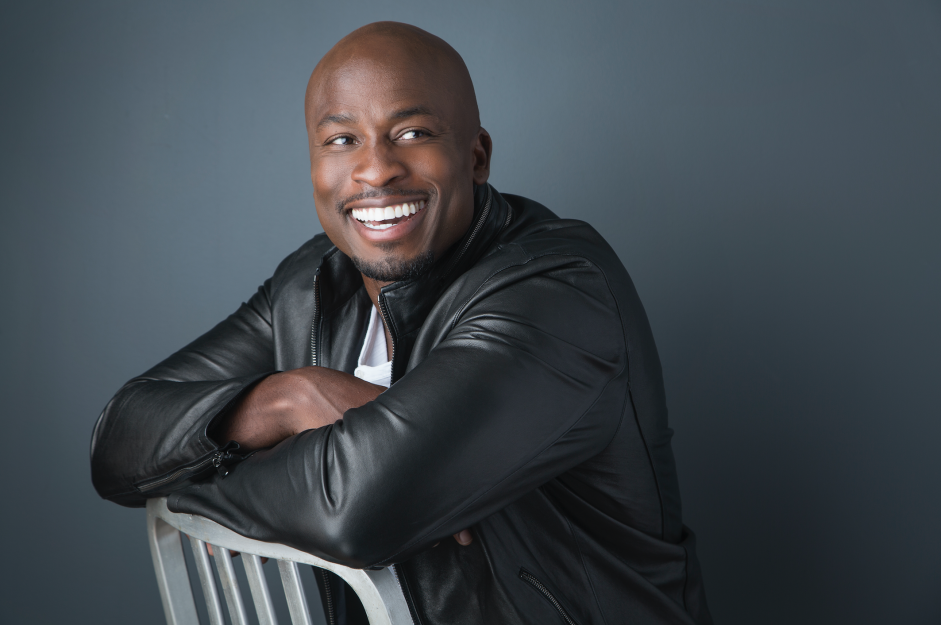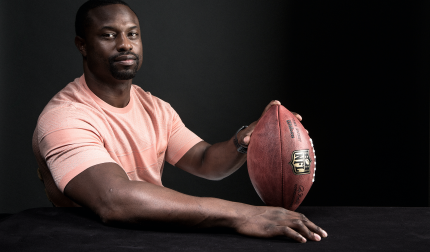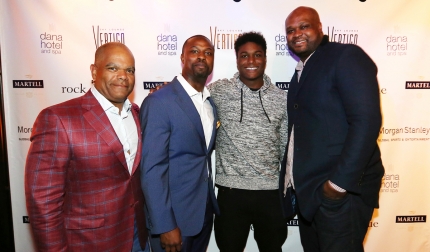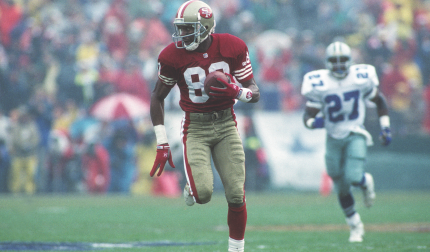We know you as the host of American Ninja Warrior and a former defensive end for the Oakland Raiders. But you were a two-time California high school basketball state champion?
Basketball was my first love! Before football, I thought I was going to play for the Lakers. It was really my older brother Kabeer’s success in football that got me into playing. All the football coaches in high school thought I should play, but I never really even watched it before that. Our Crenshaw High School basketball team was one of the best high school basketball programs in the country. It was dominant in the 70s, 80s and 90s.
Did you take to football right away once you tried it?
Not really. I fought it a lot. I played power forward and center in high school at 6-foot-6. But the truth is, once you get to college, you’re not going to play those positions at that height. I didn’t have the ball handling skills to be a guard. I might have been able to play small forward. But I had five football scholarships. I’ll never forget Tony Gonzalez calling me, because I was being recruited by California, San Diego State, Oregon, Fresno State and Colorado State. My brother played at San Diego State, and they told me I could play both basketball and football. I thought, “This will be great! I’m going to go to San Diego State and give football everything I have for one year.” When my freshman year was over, I went up to my coach and said, “Hey, you said I could try out for the basketball team.” He said, “We’re still waiting for you to become a football player.” (laughs) That was the end of my hoop dreams.
Did you see a path to the NFL, or were you just trying to get your degree?
Education always came first in my family. My parents didn’t get the whole football and basketball thing. They couldn’t afford to send us to college. There were seven of us. My dad came from Nigeria in 1974; my mom came over in 1969. They met here in the United States. My dad was a plumber. He has Parkinson’s Disease now, so he retired. My mom was a hair stylist and makeup artist. They were both entrepreneurs, and had their own businesses. They were like, “We came to this country (from Nigeria) to get you guys a better life and a better education.” Once I got to San Diego State, it was all academics for me. I really didn’t think about the NFL until my brother got drafted by the Packers. It wasn’t until my junior year that I even thought about the NFL. My first three years of school, I was focused on my scholarship.
Did you think you might get drafted by an NFL team?
I thought I might get drafted in the late rounds. I wasn’t sure, I didn’t start playing until my senior year of high school. I wanted to have realistic expectations. I remember crying when I didn’t get drafted. After the draft was over, my agent called me and said, “How does silver and black sound?” It sounds great! Going through the Raiders training camp, I felt like Rocky going against Ivan Drago! They had so many defensive ends, and I was taking every punch. I was like, “Damn, there’s no spot for me.” I remember on the last day of camp, 1 pm Pacific Time was the cut off to determine the final 53-man roster. There was a main locker room for the regulars on the team, and there was an auxiliary locker room for all of the undrafted guys like me. I hid from everyone until practice started at 1 p.m. I snuck out onto the field at 12:57, and I was hiding so they wouldn’t come snatch my playbook. Bill Romanowski came by, patted me on the butt and said, “Congratulations!” When the whistle blew to start practice, tears were flowing underneath my helmet. I couldn’t wait to get back to the hotel. Instead of calling my dad or brother, I just sat there for 20 minutes saying, “Oh my goodness. Thank God.” I was in complete silence and shock.

Once you made the team, what was it like?
I was still in awe! My brother was a huge 49er fan. Now I’m teammates with Jerry Rice, Bill Romanowski, Tim Brown, Rich Gannon, Dana Stubblefield, Charles Woodson. I was playing with some of the most iconic players in the game. Rod Woodson was my teammate! Rod was the one who would constantly give me praise during training camp and gave me the confidence I needed, asking the coaches to play me. It was so cool; I’ll never forget it.
Did you always have an eye towards broadcasting?
Growing up in Los Angeles, broadcasting was something I always wanted to do. I was the kind of guy who was talking all the time. In college, every school has a hookup major—a department that is complicit to the athletic department. Some departments hate the athletes as well. When I got to San Diego State, everyone was pushing me towards the criminal justice department. That was the department there that works with athletes. They were telling me, “You could be an FBI agent.” But I wanted to do communications and new media studies. I got them to agree to that. When they told me that I may not be able to graduate in four years in that department, I was hell bent to get degree in four years. I went to winter sessions, summer breaks; I just stayed in school. I wanted to start planning ahead. I was very realistic about my pro prospects. I always had that underdog mentality. It’s who I was.
How did you make the transition to broadcasting?
In the NFL, the broadcasting stuff was reserved for big names move the needle. I couldn’t find anyone to represent me, and I was getting very frustrated. So I called the local NBC affiliate in San Diego and asked them if I could do the postgame show for the Chargers games for free in exchange for the tape. They said, “Free? Hell yeah!” I did that for two years, and I would literally wait there when I was done for them to give me my tape. My first year, I sucked. The second year, I got a lot better. So that was my sweat equity right there.
Once I had tape of myself, my agent at Maxx Talent got me a job in two weeks working on college football games. I did Conference USA games my first year, and the next year I did the Mountain West Conference. After that, I went to NBC and did the Pac-12. The NBC job allowed me to get my first gig with NFL Network in 2012. Later that year, I got a call. “Hey we want you to interview for American Ninja Warrior.” Sure, why not? Sounds cool. I didn’t think much of at the time. You go on a million auditions and don’t get calls back. Two weeks later, I get a call. “Here’s the filming schedule. Congratulations! You’re the new host.” March 25, 2013, that was the day I got a call that changed my life.
Could you ever have imagined the impact the show would have on your life?
Never. It made me realize I had the ability to have crossover. Before that, I felt that I would only be able to do football stuff, even though I believed I could do more. It opened my eyes and made me not put limitations on myself, especially with American Ninja Warrior. Every week, I see what the athletes go through, breaking through their own boundaries. They hear the enthusiasm in my voice, because I relate to them. I may have played in the NFL, but in my heart, I am that underdog. I’ve always felt that way. It keeps me grounded and hungry to get better. That’s what I see in the ninjas. If they didn’t do well one year, they come back next year so much better. They put in the work to get better. It’s not just a TV show to them; it’s life.
Every week, we get to see a beautifully curated two-hour show. How much filming do you do to get the material needed for each show?
Each taping lasts about 12 hours! We get there at 7 p.m. and start filming at 9 p.m. We aren’t done until 5 or 6 in the morning. We have about 120 competitors in each city. The top 30 make it to the regional finals the next day. Then the top 15 make it to Vegas for the national finals.
So sometimes, when we see someone competing, it’s actually at 5 a.m.?
Yes! Out of the 120 competitors, we’ll take the 10 best stories. When we are calling them, that’s the biggest challenge. We’ve done it 120 times that day! I’m not an Ivy Leaguer like my co-host, Matt Iseman. The challenge for me is to come up with the words to describe similar things over and over. You hear yourself saying the same things, and you think, “I’ve got to come up with a different way to describe this.” A lot of times, the best line of the night won’t make it on there, because we used it for someone else. The creative juice starts to come out after midnight. At that point, I’m tired, and I don’t care about sounding professional (laughs). I’m under the influence of fatigue. This job challenges me to stay in the moment. Every run is isolated and special. I never know which warrior is going to drop out and which one is special.

The great thing about American Ninja Warrior is that anyone, male or female at any age can enjoy it. You must get recognized by a wide range of people.
At the Super Bowl, Mark Cuban came up to me and said, “I love the show! It’s a great family show!” Well, I watch Shark Tank, and I think that’s a great family show. I have four kids. It’s nice to have programs that we can enjoy as a family. I was watching one of the NBA Finals games this summer, it was like pulling teeth to get one of my kids to sit and watch. I’m like, this is what every boy should be watching. But I don’t have to do that for American Ninja Warrior. And it’s not because I’m on the show; he could care less. It’s because it’s entertaining. It’s fast paced. There are great stories. Everyone can relate to it. It’s never stagnant. Through the stories, you get to develop a better relationship with the athletes as people. And the obstacles are bright and fun, just like the gadgets kids love now. The course is like a gadget come to life. You never have to worry about shielding their eyes or covering their ears when it’s on. It’s inspiring!
What’s been the biggest surprise to you as host of the show?
I still can’t believe how quickly it’s evolved. People are now taking it on themselves to build obstacles in their backyards. I mean, American Ninja Warrior is literally creating jobs. People are popping up with ninja gyms all over the country to help people train for it.
We’ve noticed more pro athletes trying the course this season. Is this a new trend?
They’ve always been interested! My friend Kamerion Wimbley was an NFL defensive end, and he’s my size, about 6-foot-6, 250 pounds. He came in and just crushed it! My old teammate Shawne Merriman did it. Jon Ryan, the punter for the Seattle Seahawks has done it. Aaron Rodgers loves American Ninja Warrior! He wants to do it, but I imagine the Packers will probably never let their quarterback try it. There’s such a great crossover appeal. When you have pro athletes looking at it, you know you have something special.
What would you like your legacy to be?
I want to continue to inspire kids to stay active. Junior diabetes has become an epidemic in this country, and kids suffering from that condition are very special to me. I’m working with organizations to help kids stay fit, so that we don’t lose the next generation to processed foods, staying indoors. Ninja Warrior training is not like staying in treadmill or being stuck in a gym. You can do it inside or outside. It’s weatherproof. Every kid who wants to be a future Ninja Warrior is a winner to me!





